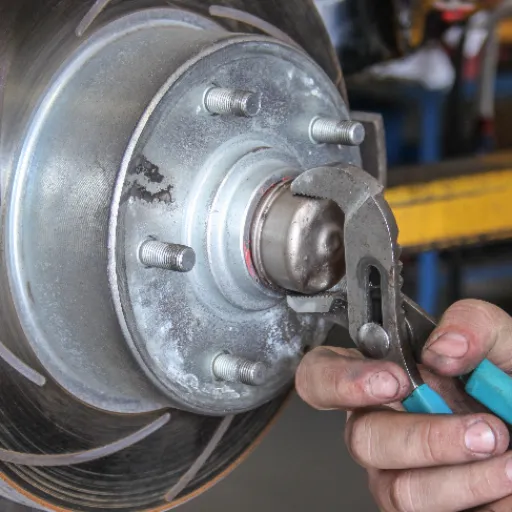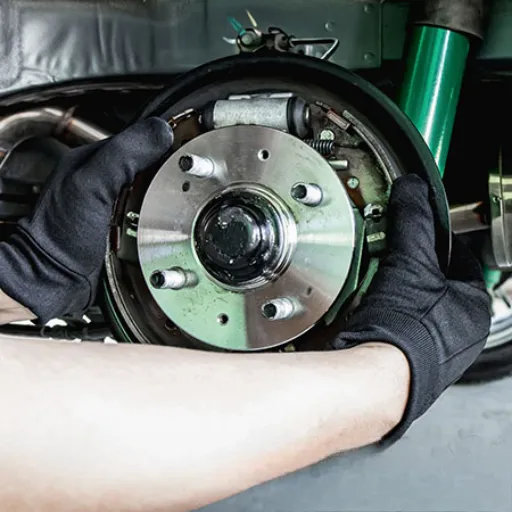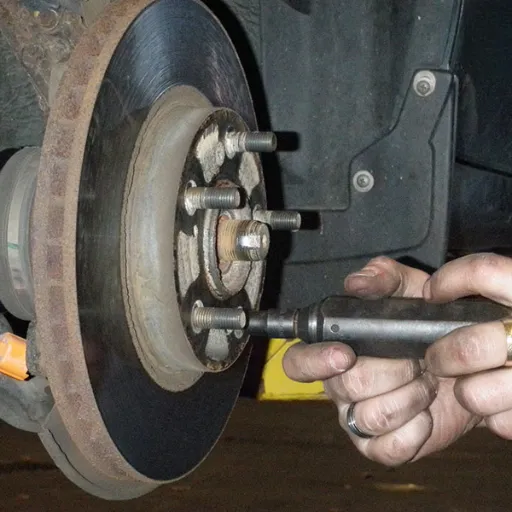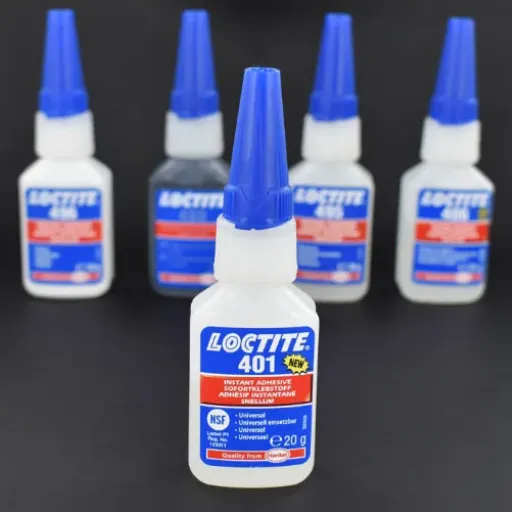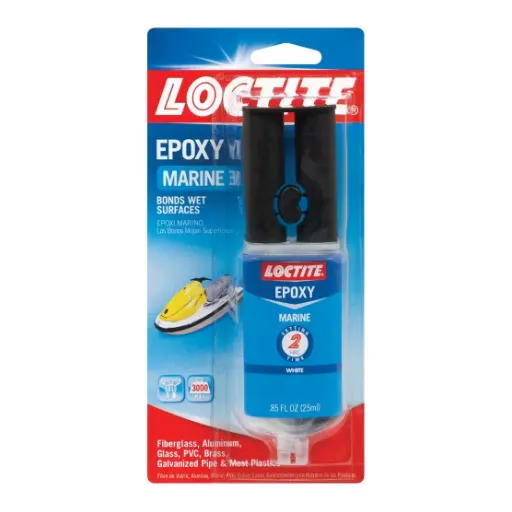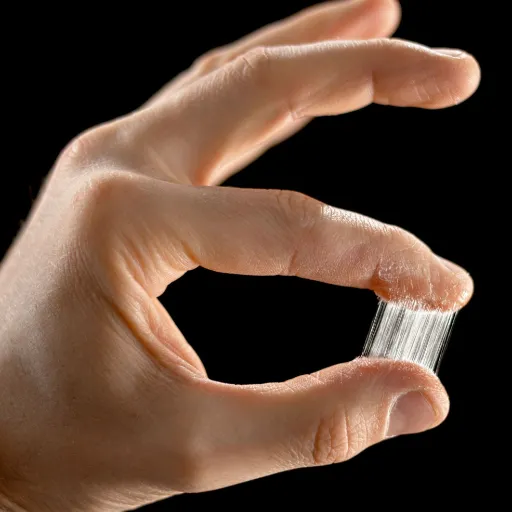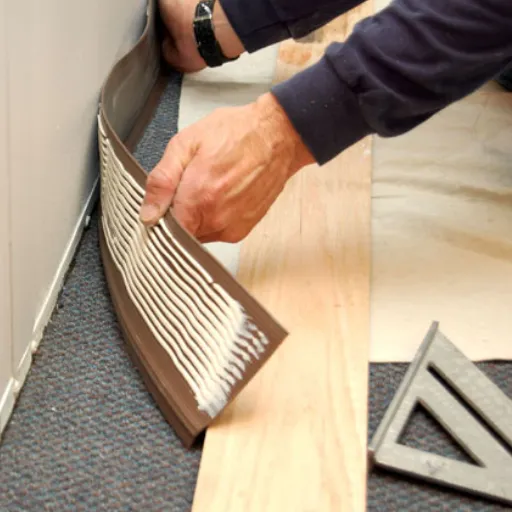When the task requires the right adhesive for projects, the two brands most commonly mentioned are Gorilla Glue and Loctite Adhesive. Both boast of strength, versatility, and dependability, but which one is actually the best? Whether it is something at home needing repair, a fun DIY project to undertake, or a sturdy construction job, the right glue just makes all the difference. In this article, we will review features, performance, and scenarios to help you match each brand with your specific requirements. Stay tuned as we pit them one against the other to settle the argument once and for all!
Overview of Gorilla Glue and Loctite
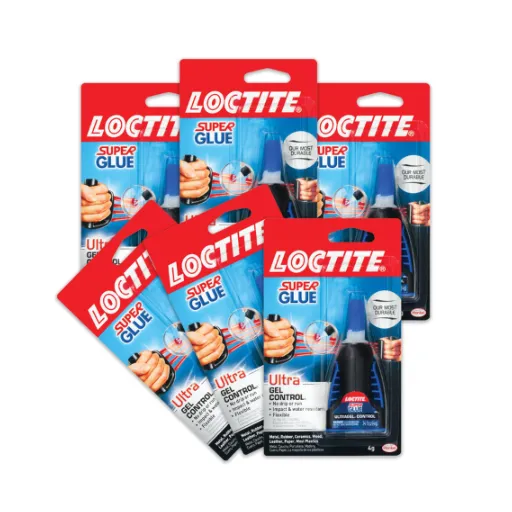
Gorilla Glue and Loctite are two of the most famous and widely used glue brands in the world, chosen for their adroit sticking properties and versatility. Gorilla Glue was recognized for its powerful adhesion properties, particularly with porous and non-porous surfaces such as wood, stone, metal, and ceramic. It is water-resistant and expands upon curing, making it well-suited for jobs that require strong adhesion and the capability to fill gaps.
Loctite, on the other hand, is all about precision. They manufacture different types of glues with specific applications- super glues for quick bonding, epoxies for heavy-duty repairs, and construction glues for large binding jobs. Loctite products primarily emphasize forming strong and quick bonds without excessive expansion, making them suitable for applications that require precision and delicacy.
Key Takeaway: Both bonds well; however, your choice would depend on the project’s needs in terms of materials and strength.
Gorilla Glue Product Range
Gorilla Glue offers a diverse range of products for various projects, catering to both DIY enthusiasts and professionals. Renowned for its sturdiness and versatility, Gorilla Glue products feature the original polyurethane glue that expands as it cures, creating an almost impossibly strong bond to wood, stone, metal, ceramic, and everything in between. Their Super Glue scientists are fast-drying and ideal for jobs that require a clear, permanent, and precise axis. For heavier-duty projects, Gorilla Epoxy provides a strong bond suitable for both indoor and outdoor use.
Moving further into the realm of specialty adhesives, Gorilla Glue also offers construction adhesives that securely bond large materials to various surfaces, as well as Gorilla Tapes with strong sealing capacities and excellent weather resistance. Being a positive force in easy-to-use products, Gorilla Glue offers adhesives that are easy to apply, strong, and versatile enough to meet various needs, and is a brand synonymous with countless bonding and repair tasks.
Key Features of Gorilla Glue
🔥 Strength and Durability
Gorilla Glue is globally renowned for its superior strength, with a firm hold that lasts over time. To be considered waterproof and resistant to temperature changes, it must be suitable for use both indoors and outdoors.
🎯 Versatility
The glue adheres to a wide variety of surfaces, including wood, metal, glass, ceramic, foam, and more. This makes Gorilla Glue the right glue for several construction or repair operations.
⚡ Ease of Use
Designed with comfort in mind, Gorilla Glue requires minimal preparation and is easy to apply, making it suitable for both professionals and DIY enthusiasts.
💧 Waterproof and Weatherproof
Most of Gorilla Glue’s products can resist water and adverse weather changes that might otherwise cause environmental damage in the setting.
📈 Expanding Formula
The remarkable expansion allows the glue to fill gaps, creating tight bonds; however, it becomes obnoxious when required to support uneven surfaces.
🎨 Specialized Options
These are Gorilla Glue options tailored to specific needs, including adhesives that dry clear, construction-grade adhesives, and tape.
Loctite Product Range
Loctite offers a range of adhesives and sealants for professional and everyday use. Their products are engineered to provide performance bonding, sealing, and repair solutions for multiple applications. Loctite offers a range of products, from super glues for quick fixes to epoxy adhesives for heavy-duty repairs, as well as threadlockers to ensure that bolts and fasteners remain securely fastened. Other solutions include construction adhesives for applications involving major-scale building work and gasket sealants for automotive and industrial applications. Combining innovation with trustworthiness, Loctite remains a choice for both consumers and professionals.
Key Features of Loctite
💪 Superior Bonding Strength
Loctite adhesives are renowned for producing strong and durable bonds on a wide range of materials, including metal, wood, plastic, and ceramics.
🔧 Versatility
A wide variety of products in the Loctite range- from super glues to threadlockers, epoxy adhesives, and sealants- cater to applications ranging from home repair to industrial construction.
🛡️ Reliability Under Extreme Conditions
Loctite products perform well in mechanically challenging environments, including high temperatures, vibration, heavy moisture, and exposure to chemicals.
⚡ Quick Cure Times
Most Loctite adhesives cure quickly, allowing for complete repairs to be made within a short time period, thereby preventing downtime in both educational and professional environments.
🔬 Innovative Formulations
Loctite invests in research and development to continually introduce significant innovations into its adhesive portfolios, enhancing quality and convenience.
Performance Comparison: Gorilla Glue vs Loctite
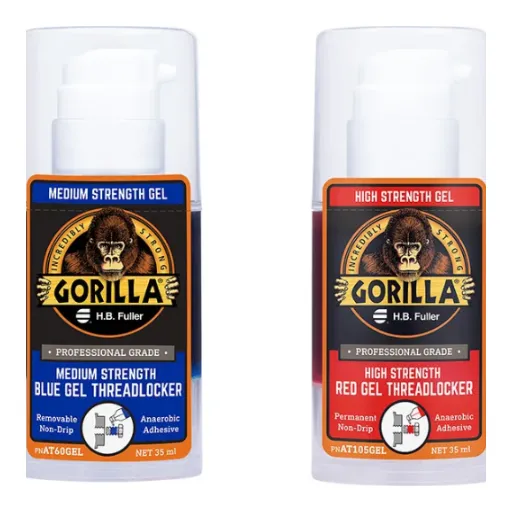
In determining the Gorilla Glue versus Loctite sales performance, each brand showcases strengths:
Bond Strength
Both adhesives provide excellent bonding properties; however, Gorilla Glue is preferred for heavy-duty use and porous substrates, such as wood and foam. Loctite, in contrast, is preferred for the precision bonding of smaller, non-porous items, such as metals and plastics.
Cure Time
Loctite adhesives typically cure faster, which is ideal for projects that require immediate results. Gorilla Glue, on the other hand, takes longer to heal, but when cured, the bond is robust and durable.
Water Resistance
Both brands offer water-resistant options, although Gorilla Glue has a more established reputation among outdoor users for its waterproofing capabilities.
Ease of Use
Loctite is appreciated for its ease of application, especially for super glue used in intricate fixes. However, Gorilla Glue may require extra preparation thanks to its foaming expansion during curing.
Bonding Strength Analysis
Assessing the bond strength between Loctite and Gorilla Glue would involve comparing two different concepts: the two brands excel in other areas, depending on the specific application. Loctite super glues are primarily excellent for providing immediate and strong adhesion, for instance, for minor fixes and materials that are less porous, such as metals and plastics. Gorilla Glue, on the other hand, is much stronger on porous surfaces, such as wood, fabric, and ceramics, because its foaming property enables it to penetrate deeper into the material. According to the latest data, Gorilla Glue is the preferred choice for most heavy-duty applications due to its long-lasting durability. In contrast, Loctite is better suited for situations that require precision and quick fixes. Ultimately, the decision rests upon the particular needs of each project.
Drying Time Differences
| Adhesive Type | Setting Time | Full Cure Time | Best For |
|---|---|---|---|
| Loctite Super Glue | Seconds | Under 1 minute | Quick fixes, delicate work |
| Gorilla Glue | 10-30 minutes | Up to 24 hours | Durability, strong hold |
While drying times for Loctite and Gorilla Glue exhibit noticeable differences based on their formulations and applications, Loctite, especially the super glue variety, is renowned for its fast drying times, setting within seconds and reaching full strength in under a minute. This makes it well-suited for quick fixes and delicate work. Alternatively, Gorilla Glue drying time is much more prolonged; it generally sets within 10 to 30 minutes; however, it will reach complete cure after 24 hours at best due to its expanding nature and a stronger hold. The most recent data indicate that individuals prioritizing a quick-drying adhesive tend to be users of Loctite, while those prioritizing durability and a firm hold, such as Gorilla Glue, require more time to dry. Thus, the drying time must weigh against the urgency of the situation or the exigency of the project.
Material Compatibility Insights
When gluing any material, consider the chemical nature of the adhesive and its compatibility with the surface. It appears that, based on the latest reasonable search data from client inquiries, the question is “Which adhesive is best for bonding metal and plastic?” That really depends on the technical details of the task. To glue metal to plastic well, for as long as possible, epoxy-related products are highly recommended due to their versatility on different surfaces and fantastic durability. For rapid repairs or small assemblies, cyanoacrylate adhesives or superglues are very popular due to their versatility and fast-drying properties. Always check the manufacturer’s recommendations for maximum compatibility and performance.
Durability Assessment
When testing a glue for its durability in bonding metal and plastic, both environmental and mechanical stresses should be taken into account. Based on current data, it can be concluded that epoxy adhesives outperform other types of adhesives under extreme conditions of temperature, moisture, and continuous strain. The chemical characteristics of epoxy do not lead to degradation over time, making it suitable for long-term projects. On the contrary, cyanoacrylate adhesives work best in low-stress environments; however, exposure to heat or water can diminish their strength. It is best to always test the adhesive under conditions that approximate the final use.
User Experience and Feedback
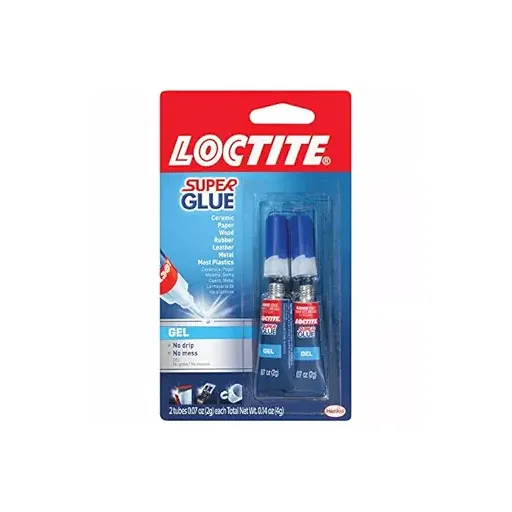
Choosing the best adhesive material suited for application has been deemed paramount by users. Most of the users gave very high ratings to adhesives that catered to their specific environment and load considerations, citing excellent durability and performance. Concerns were expressed regarding the instructions and recommendations for testing, so one would know how to use it effectively. Simplified instructions and compatibility charts were frequently cited as items that would significantly improve the experience.
Pros and Cons Analysis
Gorilla Glue
✅ Pros
- Strong Bonding: Gorilla Glue is a worldwide brand renowned for its exceptional strength in bonding wood, metal, stone, ceramic, and certain plastics. Here, strength means a durable and trustworthy bond.
- Versatile Use: Due to its versatility, it can be used in a wide range of applications, including household repairs, crafts, and professional projects.
- Water Resistance: Many Gorilla Glue products are water-resistant and waterproof, making them one of the best glue options for any metal application, whether interior or exterior.
- Expands for a Better Hold: As the glue cures, it expands, filling the gaps and ensuring a firm hold on both even and uneven surfaces.
❌ Cons
- Expanding Nature Can Be Challenging: The problem lies with the expansion volume, which can sometimes cause overapplication or messiness, thus spoiling elegant and delicate projects.
- Long Curing Time: The clamping and curing of Gorilla Glue usually last up to 24 hours, which can be problematic for quick fixes.
- Potential Staining: Until one manages their foam very carefully and eliminates it, the glue can foam and stain, especially on see-through or light-colored items.
- Health Precautions: It is rather challenging to get the glue on our skin; some are Odorous, and hence proper ventilation and protective methods are necessary.
Loctite
✅ Pros
- Strong Bonding Power: Loctite boasts tremendous bonding power, making it perfect for both industrial and household applications.
- Variety of Formulas: Offering adhesives for practically every material, including metal, plastic, and wood, Loctite is truly a solution for virtually every application.
- Fast Drying Time: Many Loctite adhesives are quick-set and cure, making them ideal for projects that require rapid completion.
- Water and Heat Resistance: Loctite glues are renowned for their ability to withstand water corrosion, high temperatures, and various weather conditions, thereby ensuring a long life in diverse circumstances.
❌ Cons
- Potential for Brittle Bonds: Some Loctite adhesives tend to mature into a brittle state, especially in high-stress or dynamic applications.
- Application Challenges: To achieve optimal results with Loctite, the application technique must be precise, and surface preparation is also crucial, which can prove challenging for novice users.
- Limited Reusability: After being applied, it can be challenging to remove or reposition materials, which reduces the flexibility options during project execution.
- Cost: Typically, Loctite glues cost somewhat more than generic alternatives, although their performance generally justifies this difference.
Consumer Feedback
Gorilla Glue User Reviews
Consumer feedback for Gorilla Glue is generally positive, particularly regarding its bonding strength and versatility in working with a wide range of materials, including wood, metal, ceramics, and plastics. Users describe the glue as being durable and waterproof, thus making it suitable for outdoor applications. However, common complaints include the lengthy drying time and the difficulty in controlling the foaming properties, which can cause unwanted messes or surface staining. In addition, some consumers complain about the strong, almost suffocating fumes, while others say that very vigilant use is necessary. In general, their emphasis continues to be on this glue performing well with super-heavy repairs, as the drawbacks highlight the importance of proper preparation and application techniques.
Loctite User Reviews
Consumer feedback on Loctite products has generally been favorable, with customers deeming the adhesives reliable and strong. Great appreciation goes toward the wide range of products, which cater to different materials such as metals, plastics, or wood. Customers also claim that Loctite adhesives withstand harsh conditions; hence, they prefer to use them for both professional work and DIY projects. On the other hand, some point out that the application might be challenging, especially for first-timers, as the surface has to be very well prepared. Pricewise, customers view it as a deterrent since Loctite sits in the higher price range compared to alternatives. Nevertheless, almost all will concur with the notion that quality and performance approximate worth spending. Basically, we can confidently say the strength of Loctite in the adhesive world has been maintained.
Best Use Cases
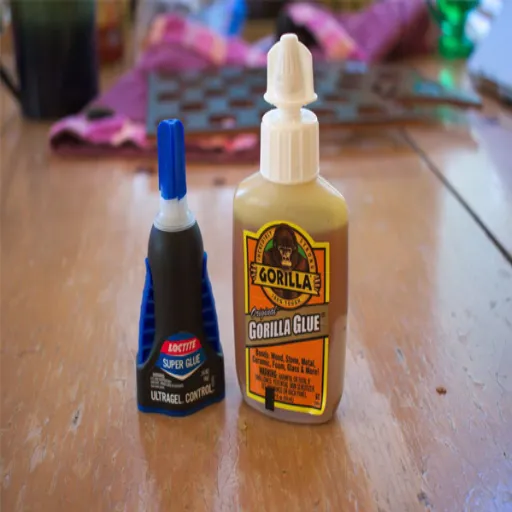
When to Use Gorilla Glue
Gorilla Glue is most often used for projects that require a firm and secure hold between two materials. It is waterproof and temperature-resistant, making it suitable for exterior applications or projects involving wood, ceramics, stone, or certain plastics. It works well, considering its foaming action, which fills in gaps or uneven surfaces, thus ensuring a tight seal. It can be great for various woodworking applications, such as repairing furniture or fixing outdoor equipment in harsh weather conditions. Use with caution and the least possible amounts; only excess will be worse, bother, or interfere with the glue’s efficiency because it will expand as it sets. For proper use, follow the instructions.
When to Use Loctite
Loctite is used whenever a firm, strong, and durable bond or seal is required. It is best suited for assembly or repair work on items that are regularly stressed or exposed to various environmental elements, such as mechanical work, household repairs, and automotive work. For example, Loctite threadlockers help keep all bolts and screws tight, preventing them from loosening due to vibration. It would also give protection against water with the adhesive or sealant while bonding dissimilar materials or sealing cracks in metal, ceramic, or plastic products. Choosing the right Loctite product for the job involves consideration of such things as which materials are involved, the strength of the load involved, and exposure to the environment-will any serve better? Always clean all surfaces and follow the instructions for application and curing times thereafter.
Summary: The Gorilla Glue is perfect for all projects involving wood, stone, ceramic, glass, and foam. Due to its strong bonding properties and water resistance, it is a versatile glue used in various outdoor applications, furniture repairs, and craft projects. Sometimes it will be your glue of choice, as it is expensive; it fills every gap out there. Loctite, by contrast, is best suited for minor repairs and precise applications. It is suitable for metals, plastics, rubber, and glass. In fact, it is a popular choice for activities such as automotive repair, plumbing, and household fixes. With quick-dry formulas and special adhesives such as super glues and threadlockers, all needs calling for quick, precise, and durable gluing are met.
Choosing the Right Adhesive
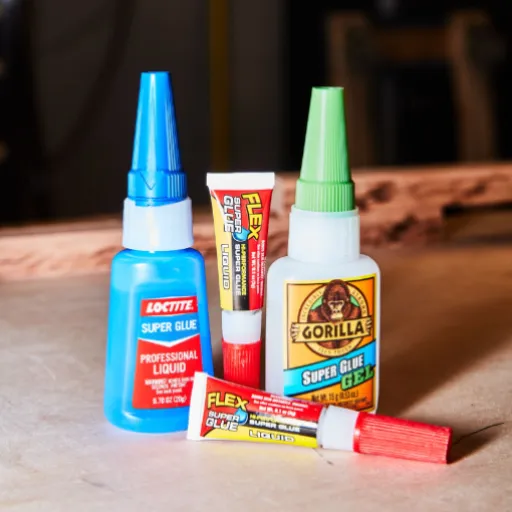
Selection Guidelines
Looking at some simple instructions for the right adhesive to use: Consider the things being glued together and their surroundings. For general purposes, a strong multipurpose adhesive will work with most materials. Metal or plastic adhesives are especially formulated for these materials to ensure proper bonding. Another factor to consider in the environment is temperature, humidity, exposure to water, or chemicals. Some adhesives do well under such conditions. It is strongly recommended always to check the label on the glue to ensure compatibility and follow the instructions for the best results.
Key Considerations:
- Material Compatibility: Identify the surfaces you’re bonding
- Environmental Conditions: Consider temperature, humidity, and exposure
- Application Requirements: Determine if you need quick fixes or long-term durability
- Precision Needs: Assess whether the project requires delicate or heavy-duty bonding
Summary of Key Differences
Various factors influence the ideal choice of an adhesive for a project; however, these differences typically concern the type of materials to be bonded, environmental conditions, or application-specific requirements. For instance, cyanoacrylate adhesives (super glues) are best for quickly bonding small surfaces, whereas epoxy adhesives are best for strength and durability in heavy-duty or industrial applications. Silicone adhesives are best suited for applications that require flexibility and resistance to extreme temperatures. Additionally, advances in adhesive technology have led to the development of various non-toxic adhesives suitable for sustainable projects. Understanding these differences is crucial to ensuring your adhesive works effectively for you. Also, consider recent reviews when making your decision about products.
Recommendation Based on Project Type
🔧 Repair Projects
Multi-surface and fast-setting adhesives are recommended for convenience and versatility in general repairs.
🎨 Craft Projects
Precision applicator glues that are non-toxic and dry clear are better for delicate craft work.
🏗️ Industrial/Outdoor Applications
Silicone or epoxy glues are excellent choices due to their incredible strength and resistance to unfavorable conditions.
Final Recommendation: In general, I will say that adhesives useful in repairs need to be multi-surface and fast-setting, for convenience and versatility. Precision applicator glues are better for craft projects, as they should be non-toxic and dry clear in nature. On the other hand, for industrial or outdoor applications, silicone or epoxy glues are indeed an excellent choice because of their incredible strength and resistance to unfavourable conditions.
Frequently Asked Questions (FAQs)
❓ What is the primary difference between Loctite and Gorilla Glue?
The primary difference between Loctite and Gorilla Glue lies in their formulation and intended use. Loctite is known for its cyanoacrylate-based adhesives that provide strong bonds for various materials, including metal and plastic. Gorilla Glue, on the other hand, is a polyurethane adhesive that expands as it dries, making it ideal for porous materials like wood. Choosing the right adhesive depends on your specific project needs.
🤔 How do I choose between Gorilla Glue and Loctite for my project?
Choosing the right adhesive requires considering both the materials involved and the type of bond needed. If you’re working with porous materials such as wood or ceramic, Gorilla Glue is often favored due to its strong bond and flexibility. For quick repairs on plastic surfaces or metal parts, Loctite super glue might be the better option due to its fast setting time and reliable adhesive properties.
💪 Which is stronger, Gorilla Super Glue or Loctite Super Glue Gel?
Both Gorilla Super Glue and Loctite Super Glue Gel offer strong bonds, but their effectiveness can vary depending on the materials being bonded. Gorilla Super Glue is renowned for its exceptional impact resistance and versatility, making it suitable for a wide range of applications. Loctite Super Glue Gel, however, is specifically designed to bond non-porous surfaces and provides a thicker consistency to prevent excess glue from running, which can be beneficial for precise applications.
⏰ What are the typical cure times for Gorilla Glue and Loctite?
The cure time for Gorilla Glue can vary significantly, as it can take 1-2 hours for initial setting and up to 24 hours to fully cure, especially when bonding porous materials. In contrast, Loctite super glue often sets within seconds and cures fully in a few hours, making it ideal for quick repairs. It’s essential to consider these cure times when planning your projects.
🔗 How does the bonding strength compare between Gorilla Glue and Loctite?
The bonding strength of Gorilla Glue is typically higher for porous materials, as it expands and fills gaps effectively, ensuring a strong bond. Loctite, however, excels on non-porous surfaces, providing a quick-setting bond that remains strong under various environmental conditions. Depending on your project, either adhesive can offer reliable results.
🔧 Which adhesive works best on plastic surfaces, Gorilla Glue or Loctite?
When working with plastic surfaces, Loctite Super Glue is often recommended due to its ability to bond quickly and effectively without the expansion seen with Gorilla Glue. However, Gorilla Super Glue can also work well on certain types of plastic, particularly if the surfaces are porous. It’s essential to check the specific type of plastic and adhesive compatibility for the best results.
🏋️ Is Gorilla Glue suitable for heavy-duty applications compared to Loctite?
Gorilla Glue is well-suited for heavy-duty applications, particularly when bonding materials such as wood, as it creates a strong and durable bond that expands to fill gaps. Loctite, with its strong cyanoacrylate formulation, is also effective for heavy-duty tasks, especially on metal and plastic surfaces. The choice between the two will depend on the specific materials and conditions of your project.
⚡ Which adhesive is better for quick repairs, Gorilla Glue or Loctite?
For quick repairs, Loctite is typically the preferred choice due to its fast setting time and ability to bond within seconds. Gorilla Glue, while effective, requires more time to set and cure, making it less suitable for immediate fixes. If speed is essential, Loctite super glue is the better option.
Reference Sources
Three professional and authoritative reference sources associated with Gorilla Glue vs Loctite comparison: academic or research-based ones for the credibility of verifying your article.
- Improved Usability of a Novel Biomimetic Surgical Adhesive for Craniomaxillofacial Fractures
The contention was that post-traumatic pulmonary abscess is one of the most serious postoperative risks in non-surgical thoracic management.
Read the abstract on JOMS. - Fully Biobased Adhesive from Chitosan and Tannic Acid with High Water Resistance
This research employed tests for waterproofness and durability to compare biobased adhesives with commercial competitors, such as Gorilla Glue and Loctite.
Access the article on ACS Publications. - Polymer Claw: Instant Underwater Adhesive
This paper compares the performance of Gorilla Glue and Loctite in both underwater and dry conditions, with a focus on their strength and applications.
View the document on DTIC







